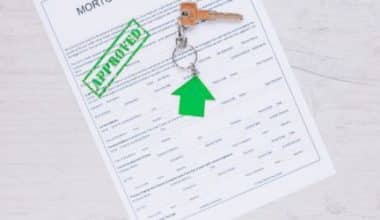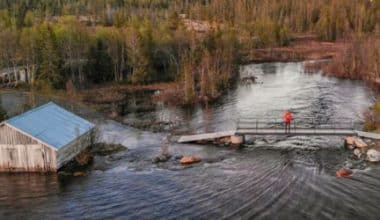North Carolina homeowners deal with a variety of difficulties every year. Thunderstorms and hail can unexpectedly cause property damage during the hot summers. The splendor of autumn hides the dangers that hurricane season poses. Winter in the mountains can bring with it snow and frozen pipes. Consequently, it is highly recommended that homeowners in the state consider getting insurance for their homes. You can get your homeowners insurance in North Carolina from companies like State Farm. Read further to learn more about homeowners insurance in North Carolina and the average cost you can get it.
What Is Homeowners Insurance in North Carolina?
Homeowners insurance is a form of insurance policy that provides financial protection in the event that your home or valuables are damaged or destroyed. A policy will specify what structures and goods are protected, to what extent, under what conditions, and how much you must pay before the insurance policy begins to pay you (this is called a deductible). Most ordinary policies will also cover your personal belongings up to a predetermined maximum, provide some liability coverage in the event that someone is hurt on your property, and provide loss-of-use coverage. Loss-of-use coverage compensates you if you are unable to stay in your home due to a covered occurrence and must stay in a hotel. Loss-of-use coverage reimburses you if you are unable to stay at home and must stay in a hotel as a result of a covered incident.
What Is the Purpose of Having Homeowners Insurance?
The following are the purposes of getting homeowners insurance in North Carolina:
- Home insurance safeguards one of your most valuable possessions.
- A homeowners insurance policy protects you against accidents that occur in your home or on your property.
- The majority of mortgage lenders need homeowners insurance.
What Exactly Does North Carolina Homeowners Insurance Cover?
In the event of an insured peril, like a fire or vandalism, homeowners insurance will pay to repair or replace your home and its contents. It can also help pay for legal representation and medical bills if someone is injured or their property is damaged due to your actions (say, a tree in your yard falls on a neighbor’s car).
However, some policies might not cover specific types of damage, such as flooding, which calls for different insurance. High winds and hail may also be excluded from policies in storm-prone coastal areas (see question below regarding hurricane coverage).
How Much is Homeowners Insurance in North Carolina?
The cost of homeowners insurance in North Carolina varies depending on the insurance plan you choose, as well as the amount of liability and property coverage and the deductibles you select. Additional elements that may impact your pricing include:
- The home’s age
- Costs of construction in your location
Homeowners Insurance Companies in North Carolina
The following are the best homeowners insurance companies in North Carolina:
#1. Travelers
For the average homeowner in North Carolina, Travelers stands out as one of the best homeowner’s insurance choices. The state’s lowest costs can be found at Travelers. It also provides policyholders with a number of optional enhancements, including flood insurance and personal property replacement cost coverage.
Travelers provide adequate coverage for most people without needing expensive add-ons, and their rates are extremely competitive. The lowest average rate in North Carolina is offered by the company, which is $734 annually. Homeowners can further reduce their prices by using the discounts available to travelers, such as the new homebuyer discount and the greenhouse discount.
#2. Liberty Mutual
It is possible to save money on home insurance by qualifying for discounts. It’s a smart idea to request a quote from Liberty Mutual to see if there are any potential savings for you. In fact, a few Liberty Mutual-partnered businesses in North Carolina frequently entitle their employees to additional discounts. You’ll probably see a list of businesses and organizations to select from on the quote form. If your employer is included on this list, you will be eligible for discounted prices.
#3. Farmers
Farmers Insurance is a well-known provider of various types of insurance, including policies for homeowners, tenants, and even life. Home insurance policies from this company are notable for their extensive level of customization. You have the choice to customize each policy type with a variety of limits and deductibles, whether consulting with an agent or using Farmers’ online quotation tool. The premiums you pay can be adjusted to fit your budget, and you can select the level of coverage that best meets your needs by modifying the policy parameters.
#4. Allstate
When it comes to home insurance in North Carolina, Allstate is one of the best you can opt for. It excels in a number of areas that define a top-notch insurer, including customer support, standing, special offers, and additional coverage alternatives. However, since the online quotation tool isn’t offered in the state, residents in North Carolina need to get in touch with independent agents to learn more and sign up.
#5. State Farm Homeowners Insurance in North Carolina
Each potential client and current policyholder is linked with a local State Farm representative who handles service inquiries. By establishing a contact for inquiries about coverage or policy administration, new homeowners can take advantage of this benefit. For individuals who require additional resources, the website of this insurer offers a wealth of information. State Farm Homeowners Insurance North Carolina is one of the best you can go for.
#6. Nationwide
Do you want your policy to provide additional roof protection? Would you like additional insurance coverage options to be bundled into the base premiums? If you’re looking for a place to begin your search, Nationwide has the most comprehensive list of endorsements and add-ons and even includes some of them in their base rate.
#7. USAA
With a population of 112,951, according to a 2017 analysis by Governing, North Carolina ranks fourth among the states in the US for the number of military personnel who are actively serving. According to a different survey by Carolina Demography, the number of veterans residing in the state in 2018 was over 667,000. The USAA membership is open to all members of those groups, including their families, making it an exclusive provider of banking and insurance services for locals. Only those connected to the U.S. armed forces or whose families include current or past USAA members are eligible to join USAA. USAA is one of the best for home insurance and any other financial services you could desire, from deposit accounts to loans, provided you satisfy the qualifying conditions.
Biggest Homeowners Insurance Risks in North Carolina
Every state along the Atlantic Seaboard considers hurricanes to be their top homeowners insurance worry, and North Carolina is no exception. Homes in the Tar Heel State sustain millions of dollars worth of damage each year from strong winds and flooding. However, North Carolina homeowners also suffer significant losses as a result of lightning strikes.
You must comprehend the typical costs associated with these risks, as well as the guidelines that home insurers adhere to when covering them, in order to keep your property financially secure in any situation.
#1. Insurance for floods and hurricanes in North Carolina
In North Carolina, there are typically two tropical storms each year on average, and a hurricane happens every three years or so. The best course of action is to always have active insurance coverage because hurricanes and floods can cause terrible damage one year and not at all the next.
Homeowners insurance in North Carolina typically includes coverage for wind damage incurred from natural disasters like hurricanes and storms. This includes the loss of roof shingles and the uprooting of trees. The coverage specifics should also be checked to be sure. If you live in a high-risk area, your insurer may decide to exclude wind damage from your standard coverage and force you to purchase it as an add-on.
However, typical home insurance will never pay for flood damage. When thousands of insured properties are affected at once by floods, the cost to insurers can be very high. Consider purchasing a separate flood insurance policy through the federally funded National Flood Insurance Program (NFIP) or a private flood insurer if you live in a high-risk flood zone.
#2. Lightning strikes in North Carolina
Thousands of claims in North Carolina are also brought about by lightning strikes on private property each year.
North Carolina homeowners spend slightly more than $11,500 for each lightning-related insurance claim. The most serious incidents involve lightning-related fires, while ground surges that overload plugged-in electronics and appliances are typically more frequent.
Most forms of lightning damage to homes are often covered by homeowners insurance. However, your ability to establish the cause of damage will determine how much compensation you actually receive from insurance for losses caused by lightning. For fires or damaged trees, this might be simpler than for ground surges.
The Best Way to Buy Homeowners Insurance in North Carolina
It’s wise to shop around and compare coverage options from various companies while seeking the best homeowners insurance for you. Finding coverage that meets your needs as a homeowner requires doing your homework, looking into discounts, and comparing prices.
As you look for homeowners insurance in North Carolina, consider the following measures:
#1. Contact a qualified agent
For free and without affecting your credit score, a team of certified insurance specialists is available to assist you in determining how much coverage you require and which provider is offering it at the most affordable rate.
#2. Find out more about the NCJUA (North Carolina Joint Underwriting Association)
The FAIR Plan supplier for North Carolina. If property owners are unable to obtain appropriate homeowners insurance in the conventional market, the NCJUA is a tax-exempt organization of insurance companies. It was “created to act as a market of last resort.” Ask your agent if a policy through North Carolina’s FAIR Plan makes more sense than going with a standard insurance provider if you reside in a coastal area at high risk of storm surge or flooding.
#3. Think about getting flood insurance
You’ll need to add flood coverage to your existing house insurance policy or buy a separate flood insurance policy in North Carolina to ensure you have complete coverage because ordinary home insurance plans don’t cover flooding. You can also get aid from an agent for this.
#4. Determine the deductible that you can afford
You’ll want to think about how frequently you’ll need to submit a claim and how much you’d be able to afford to pay out of pocket in the case of a loss because homeowners in North Carolina have a variety of deductible amounts from which you can pick.
#5. Compare quotes from agents
An agent will help you compare quotes from different providers to obtain the best homeowners insurance once you’ve decided on your coverage requirements, limits, and deductibles.
Your agent will handle all of the paperwork once you’ve decided on the coverage you want. The policy must now be signed, and the first payment must be paid.
Is Homeowners Insurance Required in North Carolina?
Homeowners insurance is not required in North Carolina. To safeguard their financial interest in your property, your lender will most certainly require home insurance if you have a mortgage. Homeowners insurance can aid in covering your losses from theft, vandalism, lightning strikes, fires, and other covered occurrences contained in your policy, even if coverage is not required. Without home insurance, you will be responsible for paying to repair or rebuild your home, as well as replacing any stolen or damaged belongings.
What Is the Average Cost of Homeowners Insurance in North Carolina?
According to NerdWallet, the average cost of homeowner’s insurance in North Carolina is $1,833 a year. That is 12% more than the average for the country. However, depending on your home’s age and value, the coverage you choose, past claims, and a host of other factors, this rate can be higher or lower for you.
How Can I Get Homeowners Insurance in North Carolina?
Reading guides like this one to review and contrast leading providers and prices in your area is the best approach to getting homeowners insurance in North Carolina. You should be aware of the coverage that each of your options can provide for your house. After you’ve done your homework, we advise receiving at least three quotes to compare prices and pick the provider who can give you complete coverage at the most affordable price.
Are Hurricanes and Tropical Storms Covered By Homeowners Insurance in North Carolina?
In some situations, if wind coverage isn’t added to your home insurance policy (if it’s offered in your area), your policy may not cover damage from hurricanes and tropical storms because of the high risk of these storms along North Carolina’s coast. To make sure you get the coverage you desire for a loss from a tropical storm, you might need to buy a combination of coverages—flood, hail, and wind, for example.
How Do I Determine Whether I Require Homeowners Insurance?
A policy with certain minimum coverage amounts may be contractually required by your mortgage lender, even if home insurance is not mandated by law in any state. For information on what is required, consult your loan agreement. Even if homeowners insurance is not required, you should still think about getting one because it can protect your house and spare you from needless out-of-pocket costs in the event of an emergency.
Does Homeowners Insurance Cover Hurricanes in North Carolina?
Damage from wind-related storms is often covered by homeowners insurance. Your carrier may, however, impose a different deductible for any claims resulting from hurricanes, wind, or hail. You should have options to tailor how this deductible affects your premium; frequently, the provider will set it as a percentage of the dwelling coverage maximum.
Final Thoughts
North Carolina is an excellent spot to settle down and purchase a property because of its stunning fall foliage, rapidly expanding towns like Charlotte and Raleigh, and low cost of living. But because some areas of the state are also vulnerable to storms, it’s especially crucial to safeguard your property with reliable homeowners insurance coverage. Fortunately, despite the hazards of extreme weather, rates for residents of North Carolina are reasonable. So, get yours today!
- BUSINESS INSURANCE CHARLOTTE NC: Cost, Requirements & Best Practices
- PROPERTY INSURANCE: What It Covers
- General Liability Insurance North Carolina: Easy Guide 2023





